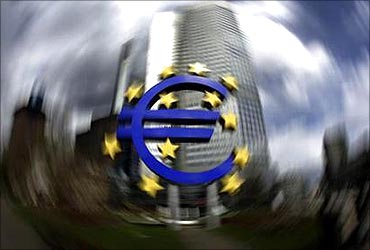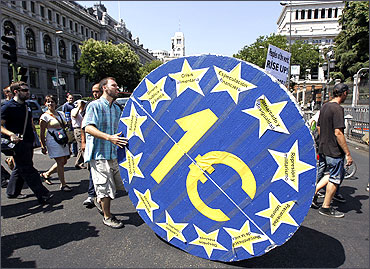 | « Back to article | Print this article |
European debt crisis: Explained in SIMPLE terms
"So where were you?" asked my roommate as I came back home very late in the night.
"Oh. You know na, Sheena broke up and she just kept crying. So I was trying to pacify her," I replied.
"Yeah. But that happened a month back, na?"
"Yeah it did."
"So?
"Arrey, the teddy bear which he had given her on her last birthday fell out of the loft. And this reminded her of all the good times they had spent together and it made her cry."
"Yeah. As a line in the song Hotel California goes, ". . . you can check out anytime you like, but you can never leave," she remarked rather philosophically.
"Hmmm. You know her situation reminds me of what is happening in Europe."
"That is quiet an analogy. Kindly explain!" she said.
Click NEXT to read on . . .
All about the European debt crisis: In SIMPLE terms
"In 1958, an organisation called European Coal and Steel Community was formed. This evolved into the European Union (EU) which was established by the Maastricht Treaty in 1993. The European Union introduced the euro on January 1, 1999. On this day, 11 member countries of the EU started using euro as their currency. It benefited countries such as Portugal, Italy, Ireland, Greece and Spain (together now known as the PIIGS)," I said.
"So how did it benefit them?" she ased.
"Before these countries started to use the euro as a currency, they had to borrow money at interest rates much higher than the rates at which a country like Germany borrowed. When these countries started to use the euro they could borrow money at interest rates close to that of Germany, which was economically the best managed country in the EU," I explained.
"As the famous American writer Michael Lewis says in a recent piece, 'The rest of Europe, in effect, used Germany's credit rating to indulge its material desires. They borrowed as cheaply as Germans could to buy stuff they couldn't afford,'" I added.
"Ah, sounds like our neighbours. They keep buying stuff they cannot really afford," my roommate said.
Click NEXT to read on . . .
All about the European debt crisis: In SIMPLE terms
"Also other than the low interest rates, the inflation in the PIIGS countries was higher than the rate of interest. As John Mauldin and Jonathan Tepper write in Endgame -- The End of the Debt Supercycle and How it Changes Everything, 'In plain English, that means that if the borrowing rate is 3 per cent while inflation is 4 per cent you're effectively borrowing for 1 per cent less than inflation. You're being paid to borrow,' I said.
"'And borrow they did. And the European peripheral countries (PIIGS) racked up enormous amount of debt in euros.' Take the case of Greece, their debt currently amounts to around 160 per cent of their GDP," I added.
"But what's the connection you are trying to make?" she asked.
"Have some patience, my dear. So, other than the citizens, the governments also started to borrow. This helped politicians keep their constituency of voters happy," I went on.
Click NEXT to read on . . .
All about the European debt crisis: In SIMPLE terms
"Take the case of Greece. A job which now pays 55,000 euros in Germany, pays 70,000 euros in Greece, even with the fact that Germany is a more productive nation. As Lewis writes, 'To get around pay restraints in the calendar year the Greek government simply paid employees a 13th and even 14th monthly salary -- months that didn't exist.'"
"Now that's hilarious," exclaimed my roommate, now quite interested in what I was holding forth on.
"There is more to come. The Greek government categorises certain jobs as arduous. These jobs have a retirement age of 55 for men and 50 for women. 'As this is also the moment when the state begins to shovel out generous pensions, more than 600 Greek professions somehow managed to get themselves classified as arduous: hairdressers, radio announcers, musicians ' write Mauldin and Tepper in Endgame."
"That's some fraud going on," she frowned.
Click NEXT to read on . . .
All about the European debt crisis: In SIMPLE terms
"Yeah, and it means more and more borrowing by the government, when they already have so much debt," I said.
"But that's just one country you have talked about. What about others?" asked my roommate.
"Take the case of Spain. Spain had the biggest housing bubble in the world. "To put things in perspective, Spain now has as many unsold homes as the United States, even though the US is six times bigger. Most of these new homes were financed with capital from abroad," write Mauldin and Tepper. Spain's real estate debt comes to around 50 per cent of its GDP," I explained.
"So with so much debt going around, why aren't countries defaulting?"
"Oh, every time there are default threats, the European Central Bank (ECB), helps out with a bailout. As Lewis writes, 'Since the start of the financial crisis it (the ECB) has bought, outright, something like $80 billion of Greek and Irish and Portuguese government bonds, and lent another $450 billion or so to various European governments and European banks, accepting virtually any collateral, including Greek government bonds. Of the 126 countries with rated debt, Greece now ranked 126th: the Greeks were officially regarded as the least likely people on the planet to repay their debts,'" I said.
Click NEXT to read on . . .
All about the European debt crisis: In SIMPLE terms
"So basically they keep paying the governments so that they don't default?" she asked.
"The situation is pretty messy because it is interlinked. Take the case of Germany, which keeps contributing the ECB rescue fund. 'The German government gives money to the rescue fund so that it can give money to the Irish government so that the Irish government can give money to Irish banks so the Irish banks can repay their loans to the German banks,' writes Lewis. In case of Greece, a lot of German and French banks which have lent money will be in trouble if Greece defaults."
"That's some connection. But wouldn't it be easier for the German government to just pay the German banks separately, instead of taking this long and convoluted route?" she asked.
"Yeah, you have a point there. There are more such cases. Take the case of Hungary. In 2004, interest rates in Hungary were at 12.5 per cent. This meant borrowing money was extremely expensive," I said.
Click NEXT to read on . . .
All about the European debt crisis: In SIMPLE terms
"'In neighbouring Austria, the banks had started to offer loans and mortgages to their customers in Swiss francs. Rates in Austria, at 2 per cent, may have been lower than in Hungary, but in Switzerland, they were even lower at around 0.5 per cent. Why would Austrians borrow at 2 per cent when they could just as easily borrow at 0.5% per cent?' write Mauldin and Tepper," I quoted.
I went on quoting Mauldin and Tepper: 'The same question applied to Hungarians, except that the difference was much bigger. So the Austrian banks, many of which also had branches in Hungary began to engage in the same business there, lending to Hungarian borrowers.'"
Click NEXT to read on . . .
All about the European debt crisis: In SIMPLE terms
"Of course, now Austrian banks have lent 140 per cent of their GDP to countries like Hungary. Even though Hungary has put in austerity measures and is trying to repay, if there was a blow up, the Austrian government wouldn't be able to save the banks and ECB might have to step in," I said.
"Similarly, Swedish banks have also lent a lot of money to Estonia, Lithuania and Latvia, countries which aspire to have Euro as their currency some day," I added.
"So it's all connected to one another?" she said.
"Yeah, it is."
"But can't countries get out of the Euro and go back to their own currencies and then print money to repay their creditors?" she asked.
"The thing is that the mechanics of leaving the euro are very messy. Also going back to your own currency might lead to other problems for a country. When countries go back to their own currencies to print it and repay debt, citizens will be concerned," I explained.
Click NEXT to read on . . .
All about the European debt crisis: In SIMPLE terms
"Why will they be concerned?" she asked.
"Simply because when a country prints currency in huge quantities, the currency will not remain of any real value. So the citizens of the country will try and move their money to either other assets like gold, or will continue using the euro," I said.
"This will lead to bank runs, with all the people queuing up at banks at the same time demanding their money back. This, of course, will lead to a lot of banks collapsing," I explained.
"Yeah, that makes some sense," she nodded.
Click NEXT to read on . . .
All about the European debt crisis: In SIMPLE terms
"Mauldin and Tepper elaborate on this using the example of Italy. 'Households and firms, anticipating that domestic deposits would be redenominated into the lira (Italy's currency before it started using the euro), which would then lose value against the euro, would shift their deposits to other euro-area banks. A system-wide bank run would follow. Investors anticipating that their claims on the Italian government would be redenominated into lira would shift into claims on other euro-area governments, leading to a bond market crisis. . . this would be the mother of all financial crises,' write the authors," I told her.
"So what's the moral of the story?" she asked.
"Oh, that's simple. Relationships are easy to get into, but very difficult to get out of," was my quick response.
The author can be reached at shonalee.biswas@gmail.com









